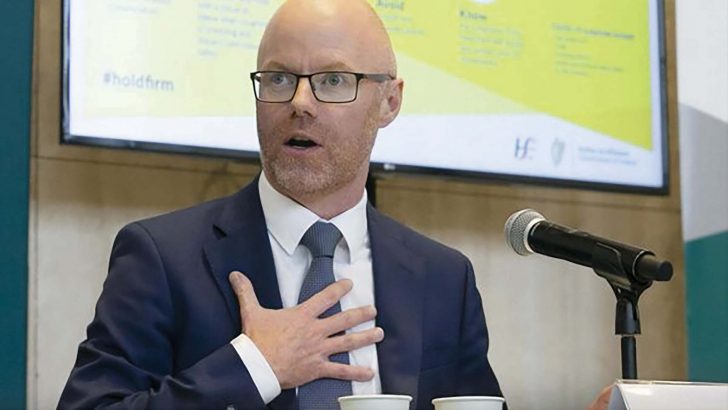The View
It was an interesting start to Holy Week 2021. Last Palm Sunday evening, Michael Kelly of this newspaper reported that the State had confirmed in the Declan Ganley case (which challenges the ban on public worship) that it was an offence to go to Mass, or for a priest to say Mass publicly (other than a funeral or wedding).
Many had suspected that this was the case. Certainly, gardaí appear to have been operating on this basis, threatening priests with prosecution, and even charging Fr PJ Hughes of Mullahoran, Co. Cavan with an offence and issuing him with a fixed penalty notice. However, there has been considerable debate on the issue. Notably, Prof. Oran Doyle of Trinity College’s Law School has expressed the view in writing that religious services (and attendance at them) were not prohibited by the ministerial regulations.
Assured
Back in October 2020, the Minister for Health Stephen Donnelly took the same line, saying that he “assured” his colleagues in the Dáil that no penalty attached to religious services. The Department of Health in an answer to this newspaper and in a written statement to the Journal.ie, similarly denied that holding a religious service was a penal offence, adding that the list of “reasonable excuses” was non-exhaustive.
Now the minister and the State say that it is indeed an offence, and that it is not a reasonable excuse to leave one’s home to attend Mass – or indeed for a priest to say Mass publicly.
In the Seanad on Monday, Senator Rónán Mullen put this conundrum to the Minister for Health, asking for clarification and offering to forgo his own speaking time in order to allow the minister a chance to clarify. However the minister, looking rather uncomfortable even behind his mask, chose not to take him up on the offer. Later in the proceedings, the Minister, acknowledging that it was a reasonable question, indicated that his department would give a written answer. At the time of writing, that answer had not been provided.
So it stands that in Ireland in Holy Week 2021 the Mass is effectively outlawed – a priest cannot lawfully say a public Mass, and the public cannot hear Mass. For many, this state of affairs is not only a deep source of upset in the holiest week of the year, but also represents an outrageous interference with the constitutionally-protected right to freedom of religion. But is it? What has been found in other jurisdictions?
Last Week the Court of Session in Scotland delivered a judgment in the Philip case which challenged the Scottish government’s restrictions on public worship. Like the Irish regulations, the Scottish law banned public worship but also went even further and closed churches even for private prayer. The case was taken by a number of Protestant ministers and another party, a Catholic priest, who was added to the proceedings at a later stage.
Judgment
The judge who delivered the judgment, Lord Braid, highlighted the fact that (similar to this jurisdiction) while the aim of the regulations in force may not be to criminalise public worship per se, it could hardly be denied that they had that effect, given that anyone breaching the regulations would be committing a criminal offence.
The key issue in the case was whether the restrictions were a proportionate response to the government’s desire to protect public health. Because the restrictions were very onerous, they required careful justification.
The court noted that compliance by those attending public worship with voluntary Covid-19 mitigation measures at an earlier point – when such worship had been permitted – had generally been very good. The Scottish government was not, therefore, able to show that gathering for public worship posed particular risks over or above those associated with any other type of gathering, some of which remained permissible. These included essential retail such as supermarkets.
Lord Braid said that while the government had “paid lip service” to the right to the free profession and practice of religion (guaranteed by Article 9 of the European Convention on Human Rights) there was “no evidence that they had accorded the importance which such a fundamental right deserves”.
Essential
The distinction drawn between ‘essential’ activities and religious worship served to emphasise this disparity in treatment. Importantly, the court said that it was impossible to measure the effect of the restrictions on those who hold religious beliefs.
In response to the argument that the closures of churches were only temporary, and that people could access religious services online, the judge rejected this, saying that online services could only been seen as an alternative to, not a substitute for, worship. At the very best, he said, it could be called ‘worship-lite’.
He highlighted the importance of physical presence in the Catholic rites of the Eucharist, Confession and Baptism, also noting the particular significance of the consecrated church building in the Catholic Faith, which was a sacred space and not comparable to one’s home: “While some people may derive some benefit from being able to observe online services, it is undeniable that certain aspects of certain faiths simply cannot take place, at all, under the current legislative regime: in particular, Communion; Baptism; and Confession, to name but three. It is impossible to measure the effect of those restrictions on those who hold religious beliefs. It goes beyond mere loss of companionship and an inability to attend a lunch club.”
Hobby
This is a welcome judicial acknowledgment of the fact, recently well-expressed by The Irish Catholic columnist, David Quinn, that, for the Faithful, religion is not a hobby.
Having regard to the ability to mitigate transmission risks through various measures – such as mask-wearing, physical distance, and hygiene – the complete ban was held to be disproportionate and therefore illegal. The judge held that the government had failed to recognise that manifestation of religious belief was a fundamental right and freedom, and had erred by treating public worship as if it were a non-essential activity. In considering proportionality, the court took into account the fact that other activities, such as professional sport and banks, had been allowed to continue to operate.
The Scottish decision is one of a number made throughout Europe, the US, Canada and South Africa recently which have struck down severe restrictions on public worship. Our Government seems unwilling to reconsider its own approach, and so, as in other jurisdictions, it may fall to the Irish courts to give the last word on this issue.


 Maria Steen
Maria Steen Health Minister Stephen Donnelly
Health Minister Stephen Donnelly 